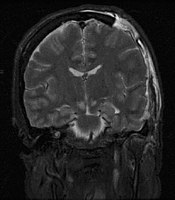
Photo from wikipedia
Gut inflammation or injury causes intestinal hypersensitivity (IHS) and hyperalgesia, which can persist after the initiating pathology resolves, are often referred to somatic regions and exacerbated by psychological stress, anxiety… Click to show full abstract
Gut inflammation or injury causes intestinal hypersensitivity (IHS) and hyperalgesia, which can persist after the initiating pathology resolves, are often referred to somatic regions and exacerbated by psychological stress, anxiety or depression, suggesting the involvement of both the spinal cord and the brain. The supraspinal mechanisms of IHS remain to be fully elucidated, however, over the last decades the series of intestinal pathology-associated neuroplastic changes in the brain has been revealed, being potentially responsible for the phenomenon. This paper reviews current clinical and experimental data, including the authors' own findings, on these functional, structural, and neurochemical/molecular changes within cortical, subcortical and brainstem regions processing and modulating sensory signals from the gut. As concluded in the review, IHS can develop and maintain due to the bowel inflammation/injury-induced persistent hyperexcitability of viscerosensory brainstem and thalamic nuclei and sensitization of hypothalamic, amygdala, hippocampal, anterior insular, and anterior cingulate cortical areas implicated in the neuroendocrine, emotional and cognitive modulation of visceral sensation and pain. An additional contribution may come from the pathology-triggered dysfunction of the brainstem structures inhibiting nociception. The mechanism underlying IHS-associated regional hyperexcitability is enhanced NMDA-, AMPA- and group I metabotropic receptor-mediated glutamatergic neurotransmission in association with altered neuropeptide Y, corticotropin-releasing factor, and cannabinoid 1 receptor signaling. These alterations are at least partially mediated by brain microglia and local production of cytokines, especially tumor necrosis factor α. Studying the IHS-related brain neuroplasticity in greater depth may enable the development of new therapeutic approaches against chronic abdominal pain in inflammatory bowel disease.
Journal Title: Cellular and molecular neurobiology
Year Published: 2020
Link to full text (if available)
Share on Social Media: Sign Up to like & get
recommendations!